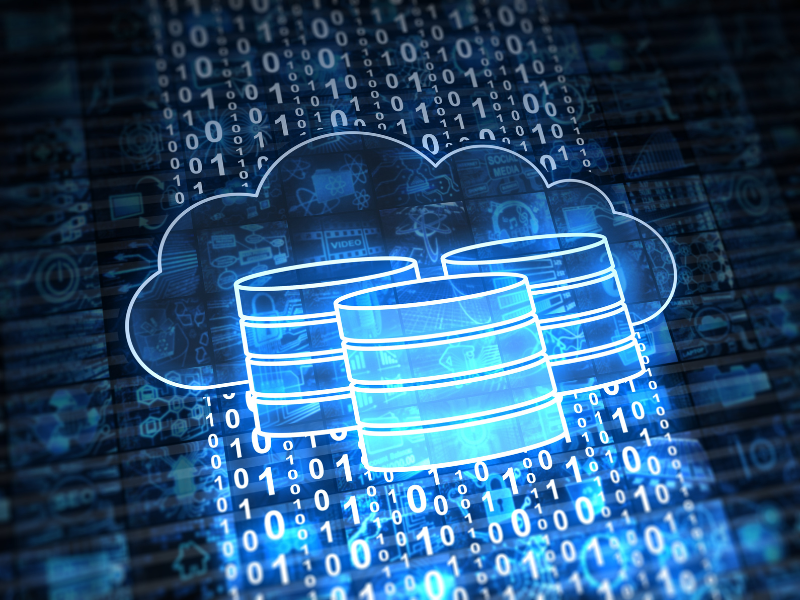Amazon Aurora is a MySQL and PostgreSQL-compatible relational database service offered by Amazon Web Services (AWS) that “combines the performance and availability of high-end commercial databases with the simplicity and cost-effectiveness of open source databases.” Aurora is a fully-managed database solution that has become very popular among companies that prioritize speed and scalability.
Amazon Aurora Serverless v2 is AWS’ on-demand auto-scaling configuration for Amazon Aurora. Aurora Serverless enables users to avail themselves of the benefits of Aurora without having to worry about server maintenance. Users only pay for what they use and can easily scale capacity up or down based on their application’s needs without managing any database capacity.
Contents
“Which One Should I Choose? Aurora or Aurora Serverless v2?”
This is a question that regularly comes up whenever our team talks to clients about database choices for their solutions.
A good way to answer this question is to walk through a (relatively diverse) series of scenarios that companies usually find themselves in.
For each of these examples, we’ve provided a table that:
- models the typical database usage patterns (measured in Aurora Capacity Units i.e. ACUs) for each scenario – these are hypothetical values that our team has come up with
- provides the corresponding costs for each database choice (Aurora vs. Aurora Servleress) – the costs indicated in the table were taken for the us-west-2 region
The ACU values we’ve provided in these examples would be relevant for small companies, for larger companies the ACU proportions would be similar but at a much larger scale.
We have also provided a graph that illustrates the fluctuations in cost for each database choice throughout the day.
Example #1: Food Delivery Company
Database Usage
This first example is of a food delivery company. There are two peaks in usage of the database one at lunch (12 pm – 1pm) and the other at dinner (8 pm – 10 pm). These are the time periods during which the highest number of customers order food.
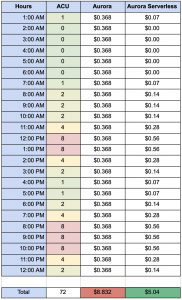

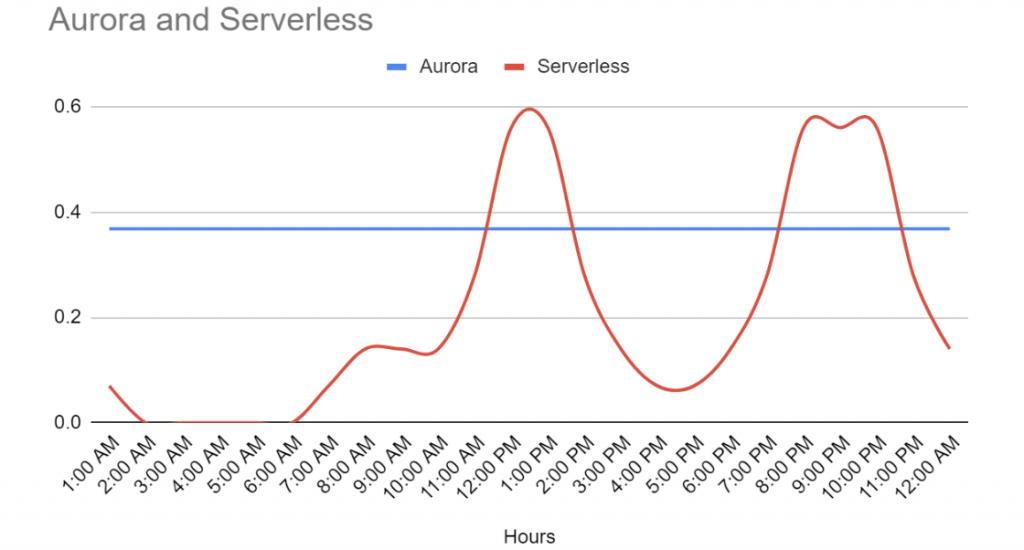
Aurora or Aurora Serverless?
The cost comparison clearly reveals that Aurora Serverless is the better choice for the food delivery company in this example. Despite being cheaper at max capacity ($0.368 vs. $0.56 for 8 ACUs), Aurora would require the company to pay for 8 ACUs all throughout the day even when the database base usage is minimal. Aurora Serverless on the other hand allows the company to pay only for what’s being used.
Daily Costs: Aurora ($8.832) and Aurora Serverless v2 ($5.04)
Winner: Aurora Serverless
Example #2: Transport Company
Database Usage
In this example, usage of the database by the transport company is minimal between 2 am – 4 am when there are no trains or buses available. Database usage picks up after 4 am and stagnates at a max value of 6 ACUs for a major portion of the day (8 am – 9 pm) when there is the highest amount of activity. Usage decreases after 9 pm since there is a gradual decrease in the number of buses or trains available.
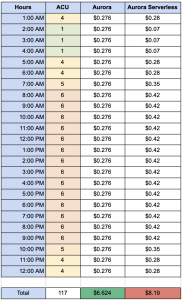

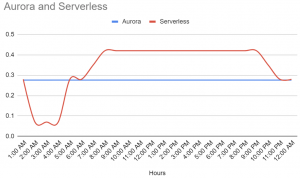
Aurora or Aurora Serverless?
The cost comparison clearly reveals that Aurora is the better choice for the transport company in this example. Aurora is cheaper than Aurora Serverless at max capacity ($0.276 vs. $0.42 for 6 ACUs) and there is a significant portion of the day (8 am – 9pm) during which database usage is maximal.
Daily Costs: Aurora ($6.624) and Aurora Serverless v2 ($8.19)
Winner: Aurora
Example #3: Corporate Intranet
Database Usage
In this third example, usage of the database is minimal before working hours (12 am – 4 am) and reaches max capacity (4 ACUs) as the day starts. There is a minor dip in usage during lunch-time (12 pm – 1pm) after which it goes back up to max capacity till the end of the working day. Usage starts to decrease at 8 pm and becomes minimal after 10 pm.
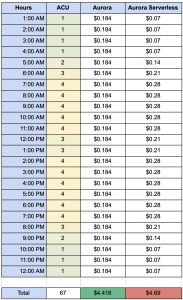

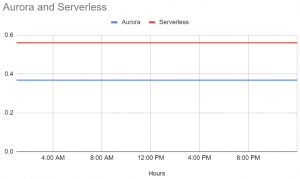
Aurora or Aurora Serverless?
The cost comparison in this example clearly shows that Aurora is the better choice. Aurora is cheaper than Aurora Serverless at max capacity ($0.368 vs. $0.56 for 8 ACUs) and the company needs to use the database at max capacity all throughout the day.
Daily Costs: Aurora ($8.832) and Aurora Serverless v2 ($13.44)
Winner: Aurora
Solution Architecture Possibilities
Here are examples of what the architecture of these solutions would look like:
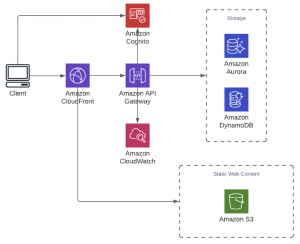
Aurora
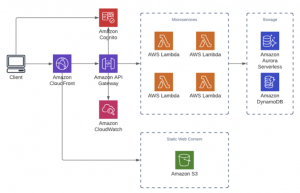
Aurora Serverless
Database Usage, The Key Factor
Database usage is the key factor that governs the choice between Aurora and Aurora Serverless. Aurora Serverless is ideal for companies such as the food delivery company discussed in example #1 that have sudden peaks in database usage with moderate or minimal usage during other periods of the day. Going Serverless allows these companies to minimize unwanted costs and pay only for what they use.
However, Aurora is the perfect choice for companies like the weather analysis company discussed in example #4 that require maximum database capacity all throughout the day. For such companies that require maximum database capacity for the majority of the time, reserving instances of Aurora for in advance would lead to additional cost efficiencies. Depending on the length of the contract (usually 1 or 3 years) companies can save between 30-70% on their database-related cloud costs.
For companies that find themselves in the middle of this spectrum (examples #2 and #3), a cost comparison such as the ones performed in this article would quickly reveal the better database choice. Lastly, for companies that would prefer to not spend a lot of time managing database capacity, Aurora Serverless is the better choice.
About TrackIt
TrackIt is an international AWS cloud consulting, systems integration, and software development firm headquartered in Marina del Rey, CA.
We have built our reputation on helping media companies architect and implement cost-effective, reliable, and scalable Media & Entertainment workflows in the cloud. These include streaming and on-demand video solutions, media asset management, and archiving, incorporating the latest AI technology to build bespoke media solutions tailored to customer requirements.
Cloud-native software development is at the foundation of what we do. We specialize in Application Modernization, Containerization, Infrastructure as Code and event-driven serverless architectures by leveraging the latest AWS services. Along with our Managed Services offerings which provide 24/7 cloud infrastructure maintenance and support, we are able to provide complete solutions for the media industry.

